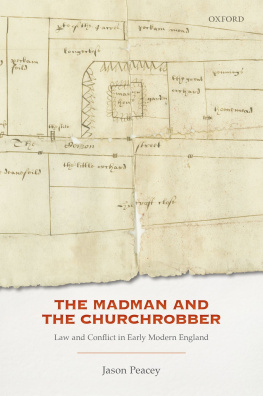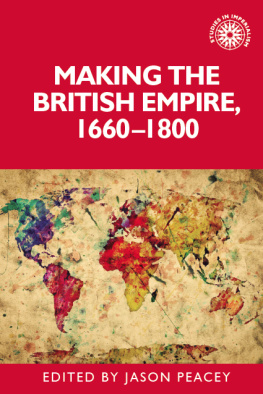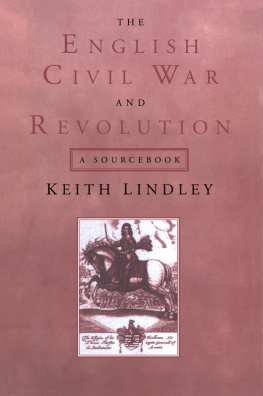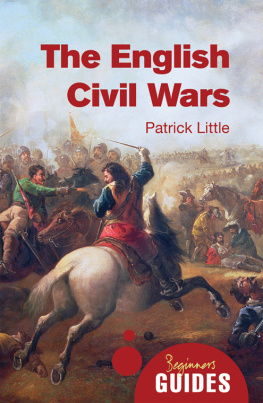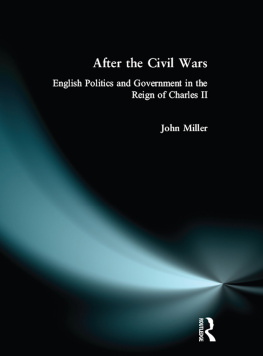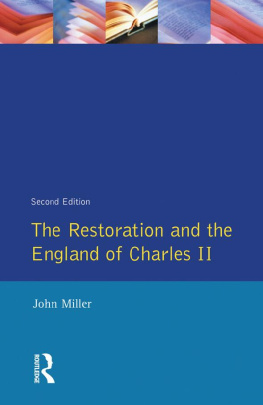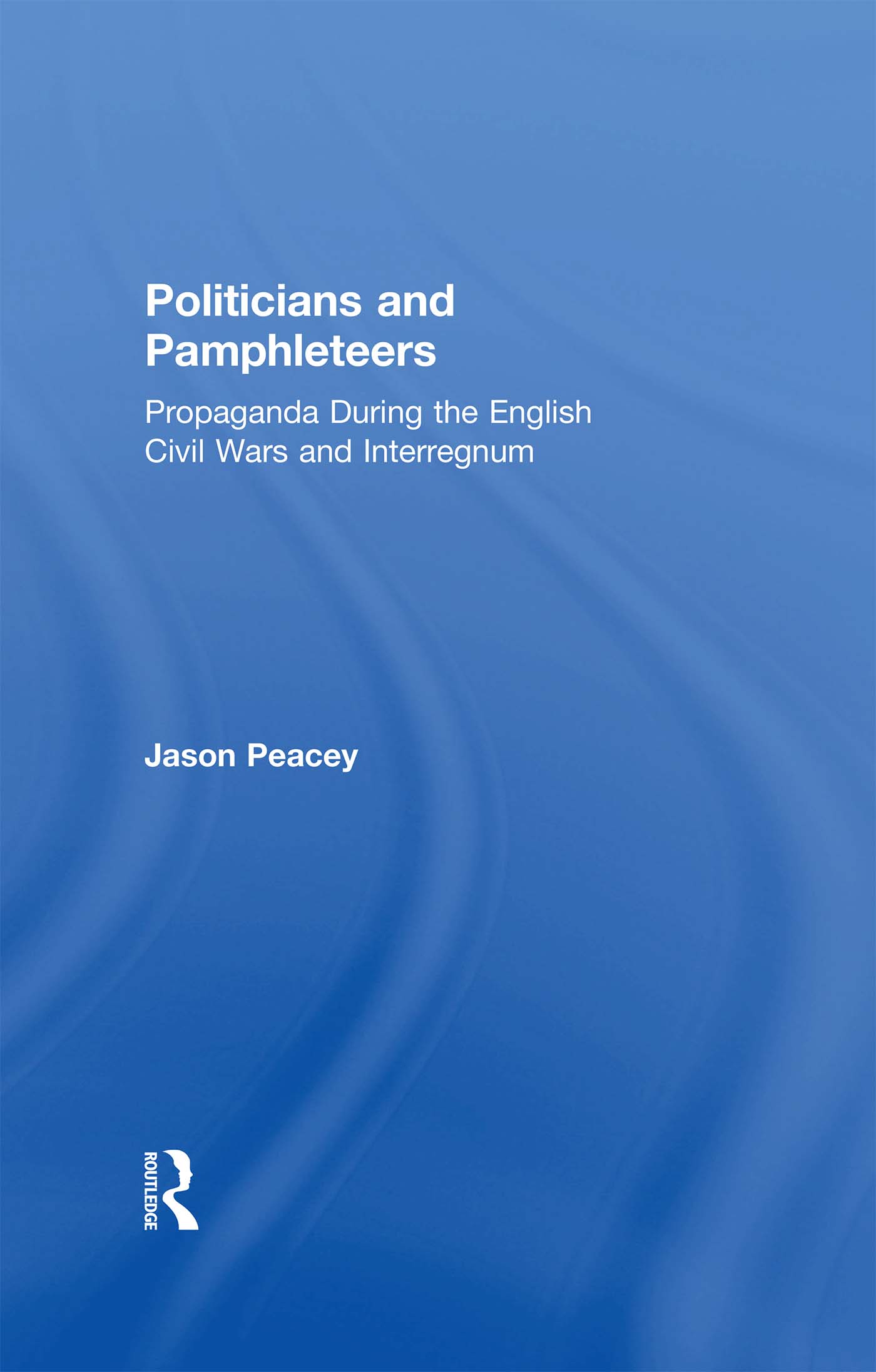CONTENTS
To Mum and Dad
First published by Ashgate Publishing
Published 2016 by Routledge
2 Park Square, Milton Park, Abingdon, Oxon OX14 4RN
711 Third Avenue, New York, NY 10017, USA
Routledge is an imprint of the Taylor & Francis Group, an informa business
Copyright Jason Peacey, 2004
All rights reserved. No part of this book may be reprinted or reproduced or utilised in any form or by any electronic, mechanical, or other means, now known or hereafter invented, including photocopying and recording, or in any information storage or retrieval system, without permission in writing from the publishers.
Notice:
Product or corporate names may be trademarks or registered trademarks, and are used only for identification and explanation without intent to infringe.
Jason Peacey has asserted his moral right under the Copyright, Designs and Patents Act, 1988, to be identified as the author of this work.
British Library Cataloguing-in-Publication Data
Peacey, Jason
Politicians and pamphleteers : propaganda during the English Civil Wars and interregnum 1. Propaganda England History 17th century 2. Pamphlets England History 17th century 3. Politics in literature History 17th century 4. Great Britain History Civil War, 16421649 Pamphlets 5. Great Britain History Civil War, 16421649 6. Great Britain History Commonwealth and Protectorate, 16491660 7. Great Britain History Civil War, 16421649 Propaganda 8. Great Britain Politics and government 16421660
I. Title
320'.014'0942'09032
Library of Congress Cataloging-in-Publication Data
Peacey, Jason.
Politicians and pamphleteers: propaganda during the English civil wars and interregnum / Jason Peacey.
p. cm.
Includes bibliographical references and index.
1. Great Britain Politics and government 16421660. 2. Politics and literature Great Britain History 17th century. 3. Pamphlets Publishing Great Britain History 17th century. 4. Popular literature Great Britain History and criticism. 5. Pamphleteers Great Britain History 17th century. 6. Pamphlets Great Britain History 17th century. 7. Propaganda, British History 17th century. I. Title.
DA406.P43 2003
942.06'28dc 21 2003045335
ISBN: 0754606840 (hbk)
Contents
This book has taken far too long to complete. I have come to liken the experience of writing it to that of taking a sauna: long, largely uncomfortable, but ultimately rewarding, if only for myself. In the course of its composition, I have accumulated substantial debts to a variety of institutions and organisations, and to a number of individuals. Expressions of thanks to academic libraries are perhaps more commonly uttered than heartfelt. But, as someone who has probably been a reader somewhat demanding of librarians time, I have genuine grounds for thanking the staff of the rare books room and manuscripts room in the Cambridge University Library, as well as the staff of Duke Humphrey's Library in the Bodleian, and the British Library, as well as to the staff of the Institute of Historical Research, whose library, like so many national treasures, is criminally neglected. I would also like to express my thanks to the staff of the Beinecke Library at Yale, where I was able to spend an enjoyable and profitable month with the assistance of an Osborn fellowship. I must also thank those innumerable world libraries whose staff have helped with my many requests for information, and the British Academy, without whose financial support, in the shape of a postgraduate scholarship, this project could never have been started, let alone completed.
Academically, I have benefited greatly from the comments offered by those who have attended the seminar papers where some of my ideas were given trial outings, often in rather crude manifestations, at Oxford, Cambridge and London, and at conferences in London, New York, Pasadena and Baltimore. The encouragement offered by scholars such as Tom Cogswell, Peter Lake, Ian Gentles, Paul Hammer, Michael Graves, Peter Lindenbaum, Barry Coward, Derek Hirst and Tim Harris has regularly served to boost my enthusiasm at times when it was flagging. I must make special mention of the members of the Seventeenth Century British History seminar at the IHR, and particularly its convenors, Ian Roy, John Miller and Justin Champion. I have also received encouragement from the supervisor of the dissertation from which this work takes its origins, Richard Tuck, as well as from its examiners Austin Woolrych and John Morrill, the latter of whom has offered more assistance, at various stages of my career, than I can ever repay. I have also benefited immensely from the experience of working for the History of Parliament. Having up to fifteen early modernists in one building on a regular basis can only be described as a privilege. However, there are some upon whom I have leaned disproportionately, and who have every reason to be thoroughly bored by this book by now. The frequency with which I have exploited the expertise of, and received references from, Patrick Little, Andrew Barclay and Simon Healy, as well as my editors, John Adamson and Stephen Roberts, is reflected throughout this work, too much so to be spelt out. Special mention has to be made, however, to those many stimulating, heated and not always entirely sober discussions regarding the seventeenth century, on big issues as well as minor details, held with Ariel Hessayon, Elliot Vernon and Phil Baker, and particularly with Sean Kelsey, David Scott and Chris Kyle. Evenings spent with these three in London's pubs have proved far more fruitful than all my time in the famed Cambridge University Library tea room, which I cherish for reasons unconnected with history.
Beyond academia, I must thank those who have kept me sane over the last decade, not least by reminding me of more important things than this book. These include Martin, Paul, Andrew, Dave, Duncan, Trevor, Emma and Annette, as well as my brother, Nathan. Most especially, of course, I want to thank my parents, for unstinting moral, as well as financial, support, and it is to them that this book is dedicated.
A&O | C. H. Firth & R. S. Rait, eds, Acts and Ordinances of the Interregnum, 16421660 (3 vols, London, 1911) |
Abbott, Cromwell | W. C. Abbott, The Writings and Speeches of Oliver Cromwell (4 vols, Oxford, 1988) |
Add. | Additional Manuscript |
AHR | American Historical Review |
BIHR | Bulletin of the Institute of Historical Research |
BJRL | Bulletin of John Rylands Library |
BL | British Library, London |
Bodl. | Bodleian Library, Oxford |
CCSP | O. Ogle, W. H. Bliss, W. D. Macray, and F. J. Routledge, eds, Calendar of the Clarendon State Papers (5 vols, Oxford, 18721970) |
CJ | Journals of the House of Commons CJH Canadian Journal of History |
Clarendon State Papers | R. Scrope and T. Monkhouse, eds, State Papers Collected by Edward, Earl of Clarendon (3 vols, Oxford, 176786) |
Clarendon, History | E. Hyde, Earl of Clarendon, The History of the Rebellion and Civil Wars in England (ed. W. D. Macray, 6 vols, Oxford, 1888) |


